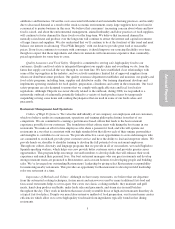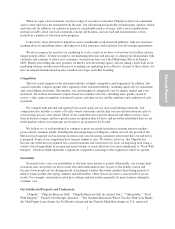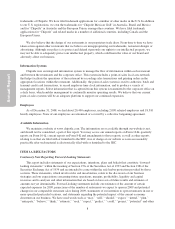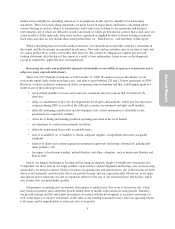Chipotle 2008 Annual Report Download - page 17
Download and view the complete annual report
Please find page 17 of the 2008 Chipotle annual report below. You can navigate through the pages in the report by either clicking on the pages listed below, or by using the keyword search tool below to find specific information within the annual report.
We may incur costs resulting from security risks we face in connection with our electronic processing
and transmission of confidential customer information.
We accept electronic payment cards for payment in our restaurants. During 2008, approximately half of our
sales were attributable to credit card transactions, and credit card usage could continue to increase. A number of
retailers, including us, have experienced actual or potential security breaches in which credit and debit card
information may have been stolen. In August 2004, the merchant bank that processed our credit card transactions
informed us that we may have been the victim of a possible theft of credit and debit card data. As a result, we
recorded losses and related expenses totaling $4.3 million from 2004 through 2006.
We may in the future become subject to additional claims for purportedly fraudulent transactions arising out
of the actual or alleged theft of credit or debit card information, and we may also be subject to lawsuits or other
proceedings in the future relating to these types of incidents. Proceedings related to theft of credit or debit card
information may be brought by payment card providers, banks and credit unions that issue cards, cardholders
(either individually or as part of a class action lawsuit) and federal and state regulators. Any such proceedings
could distract our management from running our business and cause us to incur significant unplanned losses and
expenses. Consumer perception of our brand could also be negatively affected by these events, which could
further adversely affect our results and prospects.
Failure to receive frequent deliveries of higher-quality food ingredients and other supplies could harm
our operations.
Our ability to maintain our menu depends in part on our ability to acquire ingredients that meet our
specifications from reliable suppliers. We do not have long-term contracts with any of our suppliers. Shortages or
interruptions in the supply of ingredients caused by unanticipated demand, problems in production or
distribution, food contamination, inclement weather, a supplier ceasing operations or other conditions could
adversely affect the availability, quality and cost of our ingredients, which could harm our operations. If any of
our distributors or suppliers performs inadequately, or our distribution or supply relationships are disrupted for
any reason, our business, financial condition, results of operations or cash flows could be adversely affected. We
currently depend on a limited number of suppliers for some of our key ingredients, including beef, pork, chicken,
beans, rice, sour cream and tortillas. Due to the unique nature of the products we receive from our “Food With
Intergrity” suppliers, these suppliers could be more difficult to replace if we were no longer able to rely on them.
In addition, we have relied on the same third party distribution network as McDonald’s. We may have to seek
new suppliers and service providers with pricing or other terms less favorable than those we currently enjoy. If
we cannot replace or engage distributors or suppliers who meet our specifications in a short period of time, that
could increase our expenses and cause shortages of food and other items at our restaurants, which could cause a
restaurant to remove items from its menu. If that were to happen, affected restaurants could experience
significant reductions in sales during the shortage or thereafter, if our customers change their dining habits as a
result. Our focus on a limited menu would make the consequences of a shortage of a key ingredient more severe.
In addition, our approach to competing in the restaurant industry depends in large part on our continued
ability to adhere to the principle of “Food With Integrity”. We use a substantial amount of naturally raised and
sustainably grown ingredients, and try to make our food as fresh as we can, in light of pricing considerations. As
we increase our use of these ingredients, the ability of our suppliers to expand output or otherwise increase their
supplies to meet our needs may be constrained. Our inability to obtain a sufficient and consistent supply of these
ingredients on a cost-effective basis, or at all, could cause us difficulties in aligning our brand with the principle
of “Food With Integrity”. That could make us less popular among our customers and cause sales to decline.
Governmental regulation may adversely affect our ability to open new restaurants or otherwise adversely
affect our existing and future operations and results.
We are subject to various federal, state and local regulations. Each of our restaurants is subject to state and
local licensing and regulation by health, alcoholic beverage, sanitation, food and workplace safety and other
15
Annual Report
























